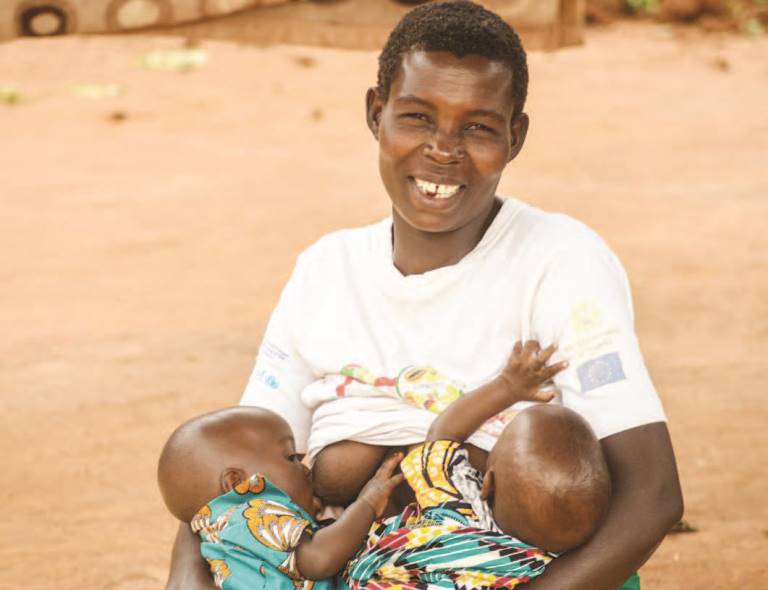Why do these twins smile?
When Seka Gundani gave birth to twins in June 2020, she knew it would never be easy to keep them healthy.
The single mother, who lives in Kachere Village, Traditional Authority Ntchema in Chiradzulu District, exclusively breastfed the babies for six months before adding soft porridge to their diet.

She brags: “It’s exciting that they love the porridge enriched with other nutritious foods. They eat it at least twice a day and their bodies are responding well.
“I have not stopped breastfeeding them on demand. Their body weight has almost doubled since I introduced supplementary feeding.”
Gundani calls the twins a double blessing though they leave her with little time to rest.
“The twins need care all day. You feed one while the other is crying, so you need more hands and foodstuffs to take care of them,” she explains.
Community initiatives
The mother of three girls and two boys has learnt the importance of all six food groups from her care promoter Ruth Pangani. The volunteer has been visiting her every two weeks since she fell pregnant.
“For over a year, she hasn’t stopped calling on me to discuss the benefits of eating food from the six food groups and how to make diversified diets from locally available foods. This helped me catch up since a lot has changed in the way we ought to feed children,” says Gundani, who last had a baby 15 years ago.
She now applies the basics for the benefit of the year-old twins, christened Rhoda and Ronald.
The nutritious soft porridge they first got after the half-a-year mark is made from whole maize flour, eggs, groundnuts powder and crushed vegetables. The nutritious diet has become a trusted weapon against malnutrition, with about 37 percent of Malawian children stunted.
“There are few malnourished children in my area because children no longer live by porridge from maize flour alone, but different foods rich in nutrients required by children,” Gundani says.
The lessons from the nutrition promoter in her community are giving the twins a healthy start in life.
A card completed by health workers during nutritional checkups shows Rhoda’s weight has surged from 5.7 kilogrammes (kg) to nine kilogrammes since she started taking the nutritious porridge in February. Ronald’s has risen from 4.2kg to 8.5kg.
Gundani happily shares the recipe that keeps them smiling and growing strong: “The porridge, which is mainly of maize flour, includes pounded vegetables from my maize field as well as body-building blocks such as eggs and powdered groundnuts. Then, I give them fruit juices from homegrown oranges, pawpaws and avocado pears. I only buy when the fruits are not in season.”
The diversified diets mirror the benefits of a five-year nutrition project called Afikepo, which literary means “let the children develop to their full potential”.
The community-led nutrition conversations sparked by the project supported by the United Nations Children’s Fund (Unicef) and Food and Agriculture Organisation (FAO) with funding from the European Union have become eye-opening for households that play home to pregnant women, breastfeeding babies and aged children below five.
Selfless volunteers
Gundani commends the dedicated nutritional promoters, who get no pay for their selfless walks to end malnutrition, which slows children’s mental and physical growth.
As the dry season kicks in, Pangani, who mentors 16 households, has motivated the mother of twins to construct a garden in her backyard.
Apart from door-to-door visits, the promoter convenes the women at a nearby church twice a month for masanje—mock cooking sessions—to share recommended ways of preparing a diversity of foods for the benefit of their households.
The volunteer sounds determined to ensure every pregnant woman, baby and child aged below five gets affordable diversified diets as well as safe water, sanitation and hygiene.
“I am excited to be part of the mindset shift because women are putting what they learn to good use. Just like that, even children from poor families are free from malnutrition,” Pangani says, smiling coyly.
What keeps her beaming?
“I feel happy when I see healthy children going to school or at play instead of being bedridden by preventable conditions, including malnutrition,” she states.
Her selfless walks are creating a generation of children free from wasting and stunting, which remain rampant in Malawi.
She says Gundani is a major winner as it is never easy to raise two children at once.
“Previously, it wasn’t uncommon to see twins or one of them wasting or stunting. Raising twins requires twice the work and resources you need to raise a baby. However, Gundani’s babies look healthy because she knows what to do,” she narrates.
‘I’ll give them the best’
And Gundani is happy that all indicators show the one-year-old babies have good nutrition.
“Since they started taking the nutritious soft porridge, they don’t cry regularly. They look much happier and healthier,” she states.
For the woman, there cannot be a better return for her unique workload than seeing the twins grow healthy.
She states: “The twins and their siblings are my future. I want them to grow well and excel in school to become self-sufficient citizens and lift me out of poverty. I will do everything possible to give them the best of care.”





